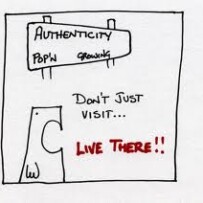Speak your authentic truth

“Speak your truth” or “speak your authentic truth” is a phrase that I have been hearing quite a lot lately. And I have adopted it as one of my 5 principles of life. But what does it mean? Does it simply mean that you shouldn’t lie to someone when talking to them? Or does it mean that you should tell the truth, the whole truth, and nothing but the truth? Does it mean “be impeccable with your word” as cited in The Four Agreements (Ruiz)? Or does it mean something a little more subtle than that?
Does it include having the ability to say “I don’t know” when someone asks us a question rather than “making up the best answer we can” in that moment? Does it include the ability to share even our strangest thoughts or a thought that’s a little out of context with someone at the risk of feeling embarrassed?
I think it includes all of these things and probably more.
I was at a seminar in the past couple of weeks where the speaker was talking about the Future of Health Care inCanada. His talk was focused on how the health care system needed to change by managing people’s expectations of what the system should provide and that it couldn’t cover all things for all people. Having been a patient of the health care system myself, and having explored alternative approaches to healthcare that are not financially covered by the healthcare system, my belief system is that we should be focused on keeping people out of the health care system (that’s a topic for a soon to be posted blog). So at the seminar I asked a question about whether we should be educating people better, beginning at a young age, as to the alternatives available for care. The speaker somewhat agreed, while establishing that his focus is on what should be done for people that are “in the system”.
While that provides a bit of background information, the interesting part of this exchange comes well after the seminar. A lady that was at the seminar has reached out to me since that seminar based on the fact that I stood up and asked the question that I asked. She told me that her background was as an RN (registered nurse) and that my question has intrigued her and she has been thinking about it ever since the event. She indicated that she has had lots of ideas about how to create change in the healthcare system and hoped I was available to bounce ideas around together. So my belief is that even though my question may not have hit home in the seminar, it has triggered a related event. To me, that only happened because I spoke my authentic truth.
Another way that we seem to hide our authentic truth is by masking our physical conditions and emotions. Have you ever tried to really disguise a limp because you didn’t want someone to notice? Or chosen not to share one of your emotions because you weren’t sure where the conversation might go. I view these as opportunities lost, or doors left unopened. As someone who has been living with a chronic condition (rheumatoid arthritis), I have learned how to disguise pain in my joints quite well. But sometimes I can’t come up with the complete mask, and so I limp or my shoulders sag. When someone asks how I’m doing, I share with them that I am learning to co-exist with arthritis – I don’t see it as a battle because in a battle there needs to be a winner and a loser, and while I have discomfort as a result of the dis-ease I refuse to see it as a battle. Inevitably, when I share my truth, I end up in a conversation that helps me. I have learned of many alternative modalities of care and I always walk away feeling thankful that I spoke my truth.
I believe that another form of speaking your authentic truth is simply putting a thought or question out to the universe. It’s quite acceptable to not know an answer to something, or to put out a “call for help”. I wrote in a previous blog about expecting synchronicity, I think that events of synchronicity and answers to our questions often occur after you’ve put the thought “out there”.
So I think that speaking your authentic truth is all about being true to yourself. I don’t believe there’s any such thing as a dumb idea or thought, and I believe that the more we share our authentic truth the more we learn about ourselves and the more we expand as individuals.
If you’d like to share an interesting authentic truth story, send it along to [email protected].







Hi Ken,
As a health-care professional we truly value (or should in my opinion) what it is that our patients have to say about how they are living and managing whatever they are dealing with. As we have spoken together — I may have stated that it’s more than just what you say, it’s how you say it and the look in your eyes as it leaves your lips. That is where truth lives. In the facial expressions and body language of the people we are trying to help. We (health practitioners in particular, and people in general) have to learn to pick up on these clues as the patients/friends/family members may hide symptoms and emotions or more simply not have the language to describe what the concern is. What I have discovered, sometimes, is an apparent embarrassment of the emotion connected to the symptom(s). Why is that?
Thank you for speaking your truth with me. It truly means a lot and is invaluable as a tool for helping me to help you.
Shaun Harris
Thanks Shaun,
These comments are very insightful. Thanks for taking the time to respond.
Cheers,
Ken